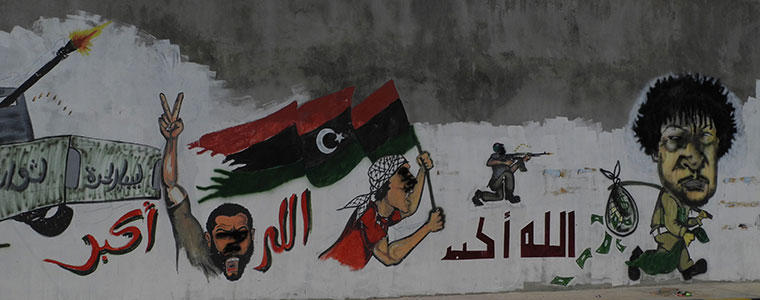
Libya’s liberation fighters and their people have inspired and mystified observers as the country’s revolution and its aftermath play out on television, the Internet and in print media across the world. Viewers saw brave, charming and quirky scenes of Libyans randomly accepting cell phone calls in the middle of television interviews, or riding BMX bikes to the front lines. It was that same boldness and grit that defied the odds – and the world’s expectations – to overthrow one of history’s most ruthless dictators.
“I am not afraid to die,” Mohammed Nabbus, the founder of Free Libya television, famously said. “I am afraid to lose the battle.” He was later killed by a sniper.
There is much about Libya’s appearance that can be deceiving. It’s home to the northeastern portion of the Sahara, the biggest desert in the world, but also features the largest Mediterranean coastline. Libya is a relatively new nation-state, but it has Roman ruins and cave paintings thousands of years old.
Contradictions abound in Libya’s political landscape too. The National Front Party -- formed from the remnants of the former National Front for the Salvation of Libya (NFSL) -- won only three seats in the General National Congress (GNC). But the founder and head of that former party, Mohammed Megaryif, is now the president of the GNC. The delayed formation of the government following the dismissal of Prime Minister Mustafa Abushagour was perceived as political instability, yet the subsequent election of Libya’s new Prime Minister, Ali Zeidan, demonstrated that Libya’s political process is working.
In the almost two years since Libya’s February 17th Revolution began, foreign journalists have been a persistent presence, magnifying the most significant setbacks and struggles such as the murder of one of America’s finest diplomats, Ambassador Chris Stevens. The reporters chronicled the unrest in Bani Walid and the dismissal of Abushagour.
Still, Libyans surmount the odds. For the most part, they haven’t retaliated against perpetrators of war-era abuses such as torture and rape or torching of warehouses full of people who had protested against the regime. Despite signs of deep post-traumatic stress, Libyans seem to have faith that justice comes from a greater being.
As foreign journalists warn of chronic instability, the insurgency and the unknown, experts from the International Monetary Fund and the United Nations have praised the Libyan transition thus far and have stated publicly that Libya is on the right track.
In a country with no real experience with democratic elections, Libyans turned out in unexpectedly high numbers to vote, with minimal violence. The role of women is increasing, too – they make up 17 percent of the GNC and participate actively in all parts of Libyan society, including as judges, journalists, civil society leaders, professors and lawyers. The transitional government continues to improve transparency by establishing blogs, Twitter accounts and Facebook pages. Cooperation and consultations between government officials and civil society leaders is increasing.
Since moving to Libya one month ago, I have come to expect the unexpected from Libyans. I recently parked my car outside a restaurant that seemed to be full of Libyan men. I was trying to get as close as possible to an ice cream shop for my kids.
When I returned to the vehicle, another car had parked beside me so closely and at such an angle that it was impossible for me to back out without hitting one of the cars on either side of mine. I was forced to ask the less-than-friendly-looking man sitting in front of the restaurant to help me maneuver out of my space. Instead, he silently got up, walked into the restaurant, and called out, “Whoever owns a blue Hyundai and parked it diagonally, get up and move it; a lady is trying to get out of her space.”
This man’s actions, to me, exemplify the Libyan attitude toward its international spectators: Believe what you will of us, but have faith; we may just pleasantly surprise you.
Rania Swadek is a program specialist for USIP in Tripoli.